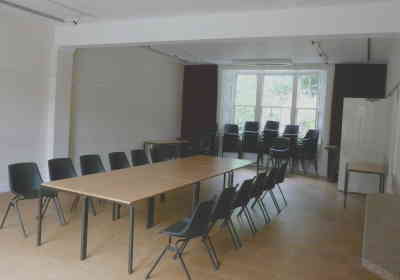Greening Our Work Lives
The Climate Crisis is not going away.
More than ever, people are taking action to reduce their household carbon footprints. Maybe you have swapped your light bulbs to efficient LED ones, turned your heating down, used less water, recycled everything. But what about when you leave your own home space and head to work. Around 60% of our UK Grid electricity use is outside of our homes, in business, industry, transport, public bodies, lighting and agriculture.
How can we be Green and reduce our carbon footprint at work ?
Outlook
The world of work is already changing, driven by technology, Brexit and now the continuing Covid pandemic …….

The need to address the climate crisis will accelerate and hasten these trends. Many changes will be helpful and improve our working lives. Some will reduce the total amount of work needed in the economy, especially work that can be done better by technology and also work that can no longer be sustained and is no longer viable due to its carbon footprint. We need to navigate the transition to a post-carbon economy skilfully to meet the needs of all stakeholders; employees, employers, unions, clients, suppliers, local communities, and last, but not least, our fragile, beautiful, shared planet.
Is your job on-side ? How does it support the Green agenda ? How can we manage working life changes in the future ? How can we think carefully for the longer term and for future generations ?
Let’s take a look at how we can make the pieces fit neatly together ….

Employees
Generally, work commitment is likely to shrink for many people. We may choose shorter working weeks, more holidays, flexible hours, hybrid working (sometimes at home, sometimes at a workplace). People will choose to earn or supplement their incomes through self-employment. Leisure time will be valued and enjoyed more fully, without corporate advertising pressures to keep buying more “stuff”.
Commuting: Isn’t it a drag. All the time and costs involved. In future, more journeys will be shared. Public transport will be cheap, easy and reliable. Many people will walk or cycle to get around. Let’s start now !
🐝 🐝 🐝 🐝 🐝 🐝 🐝 🐝 🐝 🐝
Employers
Building a sustainable work life depends on your commitment. Where does your energy come from ? Are you using a Green energy supplier for gas and electricity ? Do you ensure that equipment is turned off outside of work hours, where possible ? Are you thinking ahead to the phasing out of gas ? Are you committed to green transport ?
Where is your energy used ? Are your heating, lighting, cooling and IT systems efficient ? Where is energy used in production processes and how can it be minimised ?
Do you have convenient charging points for electric cars and electric bikes ?
Does the canteen use efficient equipment and serve a good menu of healthy food, including vegan menu options ? The same applies to vending machines. Can people refill reusable drinking bottles rather than use disposable plastic ones.
Is stationery made from recycled paper, and can the amount that is used be reduced ? Is water conserved, using low-flush loos, spray taps and cool air hand driers ? Is estate maintenance carried out with the environment and wildlife in mind ? Do your contractors and suppliers adhere to similar Green standards ? How far do supplies have to travel to reach you; can you find more local sources, saving transport costs and CO₂ emissions ?
It is a good idea to have a qualified professional energy audit. Cost savings through reduced energy consumption can usually repay the fees involved.
Here is an idea.
When people fly abroad on holiday, with all the CO₂ emissions involved, they risk travel delays and quarantine periods on their return – all likely to cause disruption, stress and financial loss.
How about employers offering people one extra day of holiday, provided they stay in the UK and do not fly. The cost is small, and their work will still get done; it may be a zero-cost option and likely to be gratefully embraced by staff.
🐝 🐝 🐝 🐝 🐝 🐝 🐝 🐝 🐝 🐝
Trade Unions
Trade Unions have an important role to play in climate policy in the workplace. They bring expertise in seeking solutions that adapt to the needs of the workforce and upgrade skills and pay. Unions are well placed to seek advice from a wide network of people who will often suggest creative ideas; win-win solutions.
An engaged trade union can form part of a Climate Action Group within the workspace to protect employees’ rights and help them adapt to change, especially where a post-carbon scenario may lead to a shorter working week. Unions can publish progress charts and support employees in suggesting innovative ideas for change. Maintain a Climate Action Group notice board.
Gender pay parity
Why on earth have we still got a gender pay gap ?
| SALARY | ||
| MEN | ||
| WOMEN | ||
According to the UK Office of National Statistics, on average, women in the UK were paid 15,5% less than men in 2020. There has been progress
over the years, but we need real equality.
Excuses are offered citing part-time work and shorter careers, reflecting time out due to parenting responsibilities. These are the outdated and unjust rules of the game. One person’s work of equal value must have the same pay as another.
It’s time to enforce the rules.
If we can’t stick to the rules, it’s time to change the game.
Waste management
Let’s remember that the word “Waste” in English is both a noun and a verb. Clearly, if we take care of the verb, the noun will follow. There is a hierarchy in the prevention of waste: Refuse, Reduce, Reuse, Re-purpose, Recycle, Remainder. If there is waste still going to landfill, we need to trace its origins and figure out how to prevent it being created in the first place.
Don’t forget that one person’s waste can be of use to someone else. Can things be passed on via online social forums, for example via the Freegle network ? Can stuff be of use to staff, charity, schools, other people or businesses ?
If you are in any doubt about dealing with waste or recycling issues, check with your local authority for advice. Always liaise with them if you are handling toxic or other hazardous materials.
Rethinking Economics for the twenty-first century.
Many of the environmentally and culturally destructive policies that have created the climate crisis have their roots in conventional outdated economic theory. We need a new way of thinking to seek well-being rather than endless GDP (Gross domestic product) growth on a finite planet. We must balance our needs with planetary limits. We live and thrive within our social and cultural networks, not as isolated, enslaved, addicted consumers.
Transition Town Milton Keynes has formed a sister group to promote the concept of Doughnut Economics, arising from a book by economist Dr Kate Raworth. Essentially, the aim is to ensure that all of people’s needs can be met justly and efficiently, while not exceeding the Earth’s capacity to provide resources and cope with pollution. The “doughnut” is an annular diagram of the area between meeting our needs (the hole) and planetary limits (the outer edges.) Labels around the diagram indicate aspects of the economy that need to be planned and managed.
The principles of Doughnut Economics will provide a creative enhancement in the way we plan our work and manage our workplaces, improving resource efficiency and the well-being of our staff and local communities.
Check out our Doughnut Economics page to follow this topic further.
🐝 🐝 🐝 🐝 🐝 🐝 🐝 🐝 🐝 🐝
Links to further information
BBC Stories; working from home, downshifting, Coops ….
Series of studies/experiences of working from home.
https://www.bbc.co.uk/worklife/tags/working-from-home
Green Jobs.
http://www.bbc.co.uk/news/science-environment-58549135
Coops in Covid era.
http://www.bbc.co.uk/news/business-56723182
Newsround: Young People Looking for a Green career.
http://www.bbc.co.uk/newsround/54191148
Al Jazeera: Anabella Rosemberg is International Programme Director at Greenpeace.
Feature on Environmental issues and Workers’ rights
https://www.aljazeera.com/opinions/2021/5/2/the-environmental-and-labour-movements-must-work-together
Energy Saving Trust: Support for communities, local authorities, supply chain and businesses of all sizes, enabling them to play their part in building a sustainable, energy-efficient future.
http://energysavingtrust.org.uk/business/
UK Trades Union Congress
Right-click on the following link and save the PDF file.
https://www.tuc.org.uk/sites/default/files/extras/greener_deals.pdf
Business in the Community
Great guide to harmonising the workspace with nature. Right-click on the following link and save the PDF file.
https://www.bitc.org.uk/wp-content/uploads/2021/04/bitc-toolkit-environment-greening-workspace-april21.pdf
Food and Drink Scotland have specialist advice for the food and catering sector.
https://foodanddrink.scot/resources/toolkits/greening-your-business/
Anglian Water
Policy to reduce their carbon footprint to zero by 2030.
https://www.anglianwater.co.uk/news/anglian-water-announces-routemap-to-reach-net-zero-by-2030/
Ecology Building Society
Policy on environmental issues at the heart of their business..
https://www.ecology.co.uk/about-us/sustainability/
Book recommendation on Doughnut Economics
Doughnut Economics: Seven ways to think like a 21st-century economist.
Raworth, Kate,
London : RH Business Books, 2017.
ISBN 978-1-847-94137-4
The Bottom Line
Greening our work lives is a Win, Win, Win opportunity.
Winning for the Employer
Winning for the Employee
Winning for our Planet


